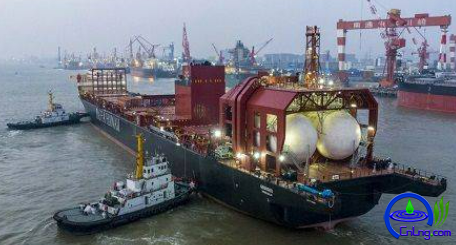免职声明:本网站为公益性网站,部分信息来自网络,如果涉及贵网站的知识产权,请及时反馈,我们承诺第一时间删除!
This website is a public welfare website, part of the information from the Internet, if it involves the intellectual property rights of your website, please timely feedback, we promise to delete the first time.
电话Tel: 19550540085: QQ号: 929496072 or 邮箱Email: Lng@vip.qq.com
摘要:近日,国际海事组织发布公开声明称,就旨在减少国际海运业温室气体排放的“IMO净零框架”草案达成一致,可能会提出新的海运燃料标准及温室气体排放定价机制。有预测认为,可持续燃料成本竞争力有望大幅提升,到2035年,可持续海运燃料成本或能与化石燃料同价。海运业..
|
近日,国际海事组织发布公开声明称,就旨在减少国际海运业温室气体排放的“IMO净零框架”草案达成一致,可能会提出新的海运燃料标准及温室气体排放定价机制。有预测认为,可持续燃料成本竞争力有望大幅提升,到2035年,可持续海运燃料成本或能与化石燃料同价。
国际海事组织表示,“IMO净零框架”草案中明确了两条减排路径:一是在全球范围内制定海运燃料标准,以降低海运燃料使用过程中的温室气体排放强度;二是建立一种定价机制刺激行业达成净零排放。 该净零框架草案被视作达成海运业脱碳战略的主要措施。去年7月,国际海事组织海上环境保护委员会发布最新国际海运业温室气体脱碳战略,提出要提高船用燃料能源效率、降低船运工作二氧化碳排放强度等目标,并表示要尽快使国际海运业温室气体排放量达到峰值,在考虑不同国情的情况下,到2050年实现净零排放目标。 海运业承担着全球约80%的贸易运输任务,具有巨大经济效益,但其温室气体排放问题也不容小觑。芬兰动力系统制造商瓦锡兰最新发布的《2050可持续船用燃料》研究报告(以下简称“报告”)显示,海运业每年温室气体排放量占全球温室气体排放总量的2%左右,若不加以控制,到2050年,其温室气体排放量可能会上涨45%,国际海运业正面临巨大减排压力。 根据国际海事组织规划,未来6个月内该组织将与各国代表进行协商,敲定脱碳战略的主要措施和相关细节,如果推行顺利,框架草案中提出的减排措施将在2025年正式启用,到2027年开始全面推行。 成本问题仍是困扰 不过,在业界看来,由于各国国情有所不同,具体政策措施仍需要更多探讨,要在几个月内就关键细节达成一致并非易事。 成本是困扰海运业脱碳的主要挑战之一。从报告规划的可持续燃料发展路径来看,当前,液化天然气市场相对成熟,可以替代更高污染的柴油等燃料;随着生物基燃料产能增长,生物基燃料或将在2030年前发挥降碳作用;而面向未来,利用碳捕捉与封存技术生产的氨燃料、甲醇等“蓝色燃料”预计将接续替代;在可再生能源装机量持续扩大的情况下,绿色合成燃料或将在2040年前后实现规模化生产,成为最新一代解决方案。 然而,数据显示,从上述可持续燃料选择来看,到2030年,这些燃料成本可能仍是当前传统化石燃料成本的3倍—5倍,对于船东来说,高昂的成本和不确定的未来都可能限制其采取脱碳措施。 同时,报告补充称,目前海运业通用的脱碳解决方案包括提升燃料效率、降低燃料用量等,但这些措施至多能够实现约27%的减排效果,要实现净零排放,可持续燃料的替代不可缺少。但要推动可持续燃料发展,海运业不仅要扩大其生产规模,更需要建设替代燃料所需的基础设施。据世界银行预估,海运业要在2050年实现净零排放,仍需要1万亿至3.7万亿美元的投资。 多举措协同或为关键 在瓦锡兰执行副总裁罗杰·霍尔姆看来,到2050年实现海运业净零排放需要包括可持续燃料在内的所有工具,国际海运业必须专注于协调政策制定者、行业和运营商之间的行动,为快速、具有经济性地生产可持续燃料提供系统性变革。 除各界协同外,采取相应手段提高可持续燃料的成本竞争力也是关键。报告认为,国际海事组织制定船用燃料碳定价标准和船用燃料排放标准的计划将显著降低可持续燃料和化石燃料的价格差异。以欧盟为例,如果碳定价和燃料标准顺利推进,结合欧盟碳市场规范,到2030年化石燃料可能会因高昂“碳税”而成本翻番,到2035年可持续燃料成本将首次降到与化石燃料同价。 此外,报告还指出,船用动力系统升级也应加速。测算认为,对于船东来说,如果能够将用能效率提高5%—10%,到2030年一定规模的船队每年可节省约7.5亿美元成本。 据了解,目前海运产业链已经开始行动,为可持续燃料发展持续提供动能。去年10月,欧洲重要港口鹿特丹港宣布,将为使用可持续燃料的船只减免港口收费,对使用绿色甲醇、氨等低碳燃料的船只提供相应折扣,最高可达50万欧元。 鹿特丹港首席运营官兼首席执行官西蒙斯认为,虽然目前行业已建立“零排放海运买家联盟”,愿意为使用零排放燃料的航运公司支付溢价,但可持续燃料价格仍然比传统燃料贵。为此,希望能够通过港口提供额外支持的举措,为船东提供更大激励,刺激船东向净零排放转变。 Recently, the International Maritime Organization (IMO) issued a public statement that it has agreed on the draft "IMO Net Zero framework" aimed at reducing greenhouse gas emissions from the international maritime industry, which may propose new maritime fuel standards and greenhouse gas emissions pricing mechanism. It is predicted that the cost competitiveness of sustainable fuel is expected to increase significantly, and by 2035, the cost of sustainable Marine fuel may be the same as that of fossil fuels. Time is running out to decarbonize the maritime industry The International Maritime Organization said that the draft "IMO Net zero framework" has clearly two emission reduction paths: one is to develop Marine fuel standards on a global scale to reduce the intensity of greenhouse gas emissions during the use of Marine fuel; The second is to establish a pricing mechanism to stimulate the industry to achieve net zero emissions. The draft net zero framework is seen as a major step towards a strategy to decarbonize the maritime sector. In July last year, the Maritime Environment Protection Committee of the International Maritime Organization (IMO) issued the latest greenhouse gas decarbonization strategy for the international maritime industry, proposing to improve the energy efficiency of Marine fuel and reduce the carbon dioxide emission intensity of shipping work and other goals, and said that the greenhouse gas emissions of the international maritime industry should reach a peak as soon as possible. Net zero emissions by 2050. The maritime industry, which carries about 80% of the world's trade, has huge economic benefits, but its greenhouse gas emissions are not to be underestimated. Finnish powertrain manufacturer Wartsila's latest "Sustainable Marine Fuels 2050" study (hereinafter referred to as the "report") shows that the maritime industry accounts for about 2% of global greenhouse gas emissions each year, and if left unchecked, its greenhouse gas emissions could rise by 45% by 2050. The international maritime industry is under intense pressure to reduce emissions. According to the IMO plan, in the next six months, the organization will consult with representatives of various countries to finalize the main measures and relevant details of the decarbonization strategy, if the implementation is successful, the emission reduction measures proposed in the draft framework will be officially launched in 2025, and the full implementation will begin in 2027. Cost remains a problem However, in the view of the industry, due to different national conditions, specific policy measures still need more discussion, to reach an agreement on key details in a few months is not easy. Cost is one of the major challenges plaguing the decarbonization of the maritime industry. According to the sustainable fuel development path planned by the report, the current LNG market is relatively mature and can replace more polluting fuels such as diesel; With the growth of bio-based fuel production capacity, bio-based fuel may play a role in carbon reduction by 2030; In the future, "blue fuels" such as ammonia fuel and methanol produced by carbon capture and storage technology are expected to be replaced. As the installed capacity of renewable energy continues to expand, green synthetic fuels will achieve large-scale production around 2040 and become the latest generation of solutions. However, the data shows that these sustainable fuel options could still cost three to five times as much as traditional fossil fuels today by 2030, with high costs and an uncertain future for shipowners likely to limit their efforts to decarbonize. At the same time, the report added that the current common decarbonisation solutions for the maritime industry include improving fuel efficiency and reducing fuel use, but these measures can achieve a reduction of about 27% at most, and sustainable fuel alternatives are indispensable to achieve net zero emissions. However, to promote sustainable fuel development, the maritime industry must not only expand its production scale, but also build the infrastructure required for alternative fuels. According to World Bank estimates, the maritime industry will still need investments of between $1 trillion and $3.7 trillion to achieve net zero emissions by 2050. Multiple initiatives in concert may be key According to Roger Holm, Wartsila Executive Vice President, achieving net zero emissions from the maritime industry by 2050 requires all tools, including sustainable fuels, and the international maritime industry must focus on coordinating action among policymakers, industry and operators to deliver systemic change for the rapid and cost-effective production of sustainable fuels. In addition to collaboration, taking appropriate measures to improve the cost competitiveness of sustainable fuels is also key. The IMO's plan to develop carbon pricing standards for Marine fuels and emissions standards for Marine fuels will significantly reduce the price differential between sustainable fuels and fossil fuels. In the European Union, for example, if carbon pricing and fuel standards proceed smoothly, combined with EU carbon market regulations, the cost of fossil fuels may double due to high "carbon taxes" by 2030, and the cost of sustainable fuels will fall to the same price as fossil fuels for the first time by 2035. In addition, the report also pointed out that Marine power system upgrades should also be accelerated. It is estimated that for shipowners, if they can improve energy efficiency by 5% to 10%, by 2030, a certain size of the fleet can save about $750 million per year. It is understood that the current maritime industry chain has begun to act to provide continuous momentum for sustainable fuel development. In October last year, the Port of Rotterdam, a major European port, announced that it would waive port charges for ships using sustainable fuels, and offer corresponding discounts of up to 500,000 euros for ships using low-carbon fuels such as green methanol and ammonia. Simons, COO and CEO of the Port of Rotterdam, believes that although the industry has established a "zero-emission Marine buyers alliance" that is willing to pay a premium for shipping companies using zero-emission fuels, sustainable fuels are still more expensive than traditional fuels. To this end, it is hoped that additional port support initiatives will provide greater incentives for shipowners to move towards net zero emissions. |




 海运业脱碳时间紧迫
海运业脱碳时间紧迫







